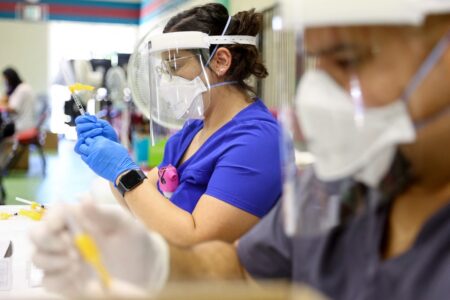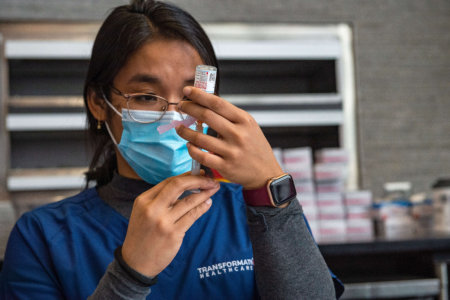
So, you’ve decided to do a diploma in nursing in Australia.
Perhaps you enjoy working in a fast-paced environment. Or maybe the idea of helping others appeal to you.
Regardless of your reasons, nursing is as rewarding as it is flexible, allowing you to work just about anywhere in the world.
This rings true as to how in-demand nurses are around the globe.
In the US, the American Association of Colleges of Nursing (AACN) notes that nursing is the nation’s largest healthcare profession, with over 4.2 million registered nurses nationwide.
In Australia, healthcare is one of the fastest-growing employment sectors, and the demand for healthcare services will continue to increase, given Australia’s ageing population.
The Health Workforce Australia (HWA) has predicted that at the rate things are going, the country will face a shortage of over 100,000 nurses by 2025 and more than 123,000 nurses by 2030.
Apart from lucrative careers and having the flexibility to work anywhere in the world, here are three other great reasons to study nursing:
3 reasons to study nursing

Healthcare is one of the fastest growing employment sectors in Australia. Source: Jeff Kowalsky/AFP
Saving lives outside of work
Don’t you wish you had the necessary first aid and medical knowledge to diffuse emergency situations outside of work?
Think about:
- How many people could perform CPR (cardiopulmonary resuscitation) if needed?
- How many know what to do if someone chokes?
- How many know what to do if someone has an asthma attack or an epileptic fit?
Not many occupations allow you to take your skills outside the workplace like nursing.
Diverse day-to-day operations
The day-to-day life of a nurse looks different every day. Working as a nurse is anything but boring. Each day comes with new patients, different challenges, and the constant need to set priorities and see that everybody is cared for.
Do bear in mind that the scope of your work depends on your nursing degree’s specialisation.
A variety of specialisations
Nursing is a broad discipline. If the general degree doesn’t meet your career aspirations, you are always free to specialise.
Some areas of specialisation include:
- Midwifery nursing
- Mental health nursing
- Adult nursing
- Pediatric nursing
Choosing to specialise is one thing, but going from a nursing student to a specialist requires a bachelor’s of nursing. Read here to find out the cheapest countries to study a BSc in nursing.
Why you should study a diploma in nursing in Australia

According to the QS World University Rankings by Subject 2023, 10 Australian universities make it to list of the top 50 nursing schools globally. Source: Mario Tama/Getty Images North America/Getty Images via AFP
Australia is home to some of the world’s most revered nursing programs.
10 Australian unis ranked in the top 50 nursing schools in the world, according to the QS World University Rankings by Subject 2023. These include the University of Technology Sydney, Griffith University and The University of Adelaide.
As mentioned, Australia’s healthcare sector is rapidly growing, given its increase in an ageing population. A National Institutes of Health (NIH) study reported that 42% of healthcare workers (HCW) were less willing to work post-pandemic.
As a result, the industry is encouraging and employing international nurses — which is great news for students planning to take a diploma in nursing in Australia as they’ll have plenty of post-study work opportunities in the country.
After completing this programme, students can practise as an Enrolled Nurse (EN).
How do I get a nursing diploma in Australia?
Before applying for a diploma in nursing in Australia, you have to take note of both general and uni specific requirements for their nursing courses.
In general, the main prerequisites include the successful completion of an Australian Year 12 qualification (or equivalent international secondary school qualification) and English language proficiency.
For non-native English speakers, you’ll need to prove your proficiency and ensure that you meet the requirements of the Nursing and Midwifery Board of Australia’s (NMBA) English language registration standard.
You can do this by completing a recognised English language test such as IELTS, TOEFL, PTE and OET.
Other than the general requirements, each uni often has its requirements you’ll have to fulfil.
Some institutions require applicants to have completed prerequisite subjects like mathematics and certain sciences.
It’s best to check with the institution of your choice about the prerequisites for their nursing programmes.
The best unis to do a diploma in nursing in Australia
Australia unis are in the top 50 for the best universities to do a diploma in nursing in Australia. Here are the top four institutions:
1. The University of Sydney
The University of Sydney offers a variety of nursing programmes, from a graduate diploma to a master’s degree.
International students can apply for faculty scholarships like The Johnson Nursing Scholarship, a need-based AU$5,000 scholarship given to nursing students experiencing financial hardship.
If not, nursing students planning to do a diploma in nursing in Australia can apply for other international scholarships.
2. Monash University
With four Australian campuses, one in Malaysia and over 100 international partners, students have access to more research collaborations, more global partnerships, and a greater choice of overseas opportunities.
Aspiring nurses can choose from foundation or diploma courses, undergraduate and postgraduate programmes.
There is also an option to pursue a double degree in nursing and midwifery.
Click here for admission requirements.
3. The University of Melbourne
From neonatal to palliative care, nursing students studying at the University of Melbourne can choose graduate diploma courses that’ll open doors to multiple career paths.
Situated within the Melbourne Biomedical Precinct, the campus is at the heart of a global hub of world-leading research institutes and health services.
Do note that some courses are not eligible for international students who require a student visa to study in Australia.
The cheapest unis for a diploma in nursing in Australia

Some of the cheapest uni that a diploma in nursing in Australia do not necessarily compromise on quality. Source: Philippe Huguen/AFP
Attending a top nursing school is great, but not everyone can afford their fees.
The truth is cheap nursing courses can be hard to find. For instance, Monash University’s Bachelor of Nursing will cost 116,400 Australian dollars (US$73,239) for students starting in 2023.
But we’ve done the homework for you. Here are some of the cheapest unis for courses in nursing in Australia:
- The University of Notre Dame — AU$36,699 (US$24,527.96)
- Murdoch University — AU$31,200 (US$20,852.68)
- Edith Cowan University — AU$38,500 (US$25,731.67)
- Institute of Health and Nursing Association (IHNA) —
- AU$30,000 (US$20,210.10)
Do note that in order to be a certified nurse, all nursing students are required to take an exam.
In the US, Australia and Canada, the National Council Licensure Examination (NCLEX) is a nationwide exam for nursing licensing.
The National Council of State Boards of Nursing (NCSBN) says that every state in the US is responsible for the licensure of nurses within that state.
The easiest diploma in diploma in Australia
Let’s be real — there isn’t an “easy” course to pass. Courses in nursing require students to process large amounts of information as well as manage their time between clinical, lab work and lectures.
Compared to medical school, however, some might find nursing much easier as no previous degree is required.
If you’re considering nursing school, here are five things you should know.
Answering questions about diploma in nursing in Australia

If this is your first time hearing about a diploma in nursing in Australia, here are five things you need to know. Source: Robert Wallace/AFP
1. Is diploma in nursing worth it in Australia?
Yes. As mentioned, studying for a diploma in nursing in Australia opens many doors for both domestic and international students due to the high demand for nurses.
What’s more, you’ll be studying at the world’s best institutions and learning in a multicultural and diverse environment.
International students are also allowed to work part-time during their studies.
Post-study work opportunities are also abundant. Starting July 2023, students who wish to stay back in the country can stay on for up to six years on their Temporary Graduate visa (subclass 485).
This increase makes Australia one of the most generous host countries in terms of post-study work rights.
2. How long is diploma of nursing in Australia?
The length of a diploma in nursing in Australia depends on the type of diploma you choose.
For example, the Institute of Health and Nursing Association (IHNA) offers an 18-month that’ll fast-track your way to become eligible as an Enrolled Nurse with the Nursing and Midwifery Board of Australia (NMBA).
Other courses, such as a bachelor of science in nursing, are a standard three or four-year route.
3. Are nurses in high demand in Australia?
Yes. The Health Workforce Australia (HWA) has predicted that at the rate things are going, the country will face a shortage of over 100,000 nurses by 2025 and more than 123,000 nurses by 2030.
This is also demonstrated in how well nurses are paid. The average salary of registered nurses in Australia is around AU$80,906 per year or AU$41.49 per hour, Talent.com reports.
4. Can I get work visa after diploma in Australia?
After completing your diploma, you are required to continue pursuing your bachelor’s degree in nursing.
Upon graduation, you will qualify for a Temporary Graduate visa, which allows you to stay back in the country for up to 18 months to look for work.
5. Can I get PR (permanent residency) from diploma in nursing in Australia?
It is possible to get a permanent residency status by doing a nursing degree in Australia.
As mentioned, you can apply for a Temporary Graduate visa once you graduate from your bachelor’s programme. Once your Temporary Graduate visa is up, you should be eligible to apply for the Post Study Work Stream visa.
This visa allows you to stay in the country for a longer period of time (usually between two and four years, depending on your qualification) temporarily.










